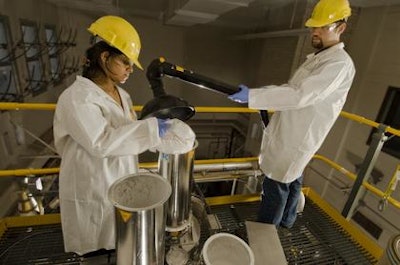
Janssen Pharmaceuticals recently joined an ongoing collaboration with Rutgers University by giving them $6 million to expand research into a “revolutionary” method in manufacturing pharmaceuticals.
Their work is focused on continuous manufacturing — an approach they say could be the most significant development in pharmaceutical processing in decades.
Instead of mixing raw materials into large batches and then pressing the material into tablets, continuous manufacturing would allow plants to feed the materials into an ongoing process. Once implemented, the researchers say this new method will be less expensive, more efficient, require a smaller facility, and help boost quality control.
Although the technology has already been around and gaining momentum in the last few years, Rutgers says the industry has been slow to adopt it on a wide scale. But they hope that will soon change. And if implemented throughout the industry, the researchers say the major shift would be akin to when auto manufacturers switched from producing one car at a time to an assembly line.
“Continuous manufacturing represents the future of advanced pharmaceutical manufacturing,” said Fernando J. Muzzio, professor II, Department of Chemical and Biochemical Engineering. “With this latest funding, our center is now better positioned than ever to serve the scientific community, pharmaceutical companies and the regulatory agencies as the industry moves to this new process over the next decade.”
The collaboration to bring s continuous manufacturing facility to life began about five years ago. Since then, Rutgers has partnered with New Jersey Institute of Technology, Purdue University and the University of Puerto Rico at Mayaguez.
Rutgers has already built a full-scale continuous manufacturing facility inside an engineering building on one of its campuses. Janssen is now using that model for a production line in Puerto Rico that will transition to continuous manufacturing once it has FDA approval.
According to Rutgers, “When the line is operating, tablets pass through a series of tubes attached to a two-story tall structure. [Currently] the tablets are for testing only and are not for patients.”
The researchers hope that plant will then serve as a template for other pharmaceutical companies.
“Our collaboration with the Rutgers Engineering School has been very productive in helping us to prepare for the future by delivering the highest quality medicines in the most efficient way,” said Mauricio Futran, vice president, advanced technology, Janssen Manufacturing & Technical Operations. “We look forward to continuing to work closely with Rutgers and with regulators on the advancement and implementation of this important manufacturing technology.”






















